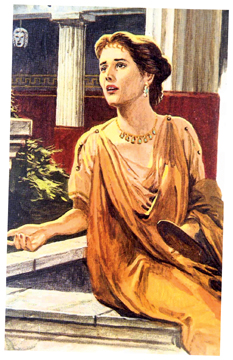Today is the Ides of March
by Gwen Herat
The Ides of March has come but not gone. For Shakespeare the date is
the most important and significant in the literary calender which takes
us to Calpurnia, wife to Caesar who seeks to prevent Caesar from going
to the Capitol due to a bad dream she had towards dawn. It rattled her
when she spoke to Caesar:-
|

‘Et Tu Brute?’ |
Calpurnia: ‘I never stood on ceremonies,
Yet, now they fright me. There is one within;
Besides the things that have that we have heard and seen.
Recount most horrid sights seen by the watch.
As lioness hath whelped in the streets, and graves have yawn'd and
Yielded up the dead.
Fierce fiery warriors upon the clouds. in ranks and squadrons and
right form of war. Which drizzled blood upon the Capitol, the noise of
battle hurled in the air
Horses did neigh and dying men did groan
And ghosts did shriek and squal about the streets'.
Caesar failed to heed the forewarning of his wife and proceeded
towards the Capitol where his fate awaited him. He had done no harm but
he may do harm. That is what irked Cassius who was the main plotter of
Caeser's assassination and Brutus a willing partner.
Plutarch
The whole plot was a revolution that included the young Octavius and
the ever-faithful Antony, who later turns hero to avenge the great
Caesar's death that was planned and executed pn the Ides of March. Like
Calpurnia, Brutus’ wife, Portia takes him to task to prevent him going
out on this fateful day but fails.
It was Thomas North's Plutarch that Shakespeare adapted to write
Julius Caesar and the Bard is indebted to its study. He was forced him
to write this masterpiece that closely followed with skill at times
turning to prose.
One can trace how close to Caesar the pages of The Plutarch had had
been in reality with the uncertain answers which Brutus gives to Cassius
on the duty of suicide.
Take a look at Antony's epitaph upon Brutus which is almost word to
word from the version of Thomas North; after they fight at Phillipi and
before and after the battle when Brutus demands from Cassius what he
would do in the event they lost the battle. The day was the Ides of
March.
‘This was the noblest Roman of them all
All the conspirators save only he
Did they did in envy of Caesar
He only general honest thought
And common good to all, made one of them.
Suicide
Antony was conscious that the Ides of March had come not gone yet. He
was also aware that Brutus would blame Cato for the suicide of Causius
who fell upon his sword held by his slave. They were all conspirators
and partners in crime with one mission to assassinate Caesar. The plot
was cooked before hand and all being false to the philosophy of
eradicating what they together thought was for the good of Rome, lived
to suffer guilt and remorse.
Yet one plucked courage to avenge Caesar's death only for the reason
that Shakespeare was to use him as a central character in another
classic he was to write. It was Antony.
|

The beautiful tragic Portia from Julius Caesar who fails to
prevent her husband's plot to assassinate Caesar, commits
suicide rather than be ashamed. |
Though on the surface Antony appeared the reluctant one but the too
watched when all conspirators and Senators stabbed Caesar, one by one
and as Brutus took his aim, a surprised Caesar just blurted:-
‘Et tu Brute'?
And Brutus loved Caesar; and why did he in his insolence acted the
way he did? Perhaps Shakespeare was an artist in crime and detected his
art in the person of Brutus.
He loved the outcome of evil doing for its own sake and Brutus was
his victim. He put his motives and the villainies in preparation for the
Ides and projected it upon his wife, Portia into questioning him.
Shakespeare brought the assassination right to the steps of Portia
and Calpurnia, the two women who were indirectly involved. They both
lived to regret and became widows, minutes after the Ides came and went.
And Antony took over the buriel of Caesar with one of the finest
orations that Shakespeare wrote and tribute to a great statesman as the
Ides of March faded off to history:-
‘Friends, Romans, countrymen; lend me your ears.
I come to bury Caesar, not to praise him
The evil that men do lives after them.
The good is oft interred with the bones.
So let it be with Caesar. The noble Brutus
Hath told you that Caesar was ambitious;
It was so, it was a grievous fault,
And grievously hath Caesar answer'd
Here, under leave of Brutus and the rest
For Brutus is an honourable men
Come I to speak in Caesar's funeral
He was my friend, faithful and just to me |

